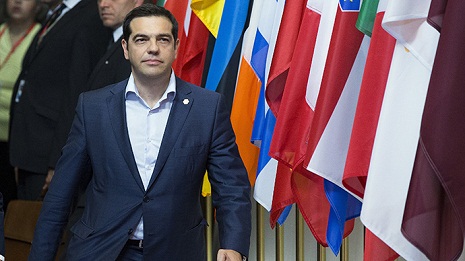The referendum will be held on July 5, a few days past the June 30 deadline, Tsipras announced.
In order to avoid a technical default, Athens will ask for a short-term extension on the bailout program and buy time to hold the popular vote. Tsirpas further added that German Chancellor Angela Merkel and European Central Bank chief Mario Draghi have already been informed of the plans.
The referendum will be a simple “yes” or “no” question on the measures proposed under the debt deal, local media report. One way or the other Tsipras said that he will respect the will of the people, who have voted for him for his anti-austerity campaign promises.
Considering the public sentiment, the Greeks would likely reject the terms of the bailout agreement offered by creditors, the PM’s senior aide, Nikos Pappas, said. Meanwhile, Greece’s development minister Panagiotis Lafazanis also remains certain that the Greek will react “with a resounding no.”
The ruling Syriza party urged voters to reject “the ultimatum by the lenders “ and “say yes to the proposal made by the government.” The leader of the Independent Greeks party, and Tsipras’ junior coalition partner, meanwhile urged the voters to protect the country’s sovereignty as they did “in 1940 when Greek people decided to say no to foreign armies.”
“I call for all of the party to participate in this big celebration of democracy called a referendum and to vote `No` – no to handing away our independence,” Panos Kammenos said.
Greece’s opposition Socialist party was quick to blame the Prime Minister for an inability to make decisions by himself and shifting responsibility on the public.
“Since Mr. Tsipras is unable to take responsible decisions, he ought to resign and let citizens vote for their future via elections,” PASOK’s leader Fofi Genimmata stated.
The Greek opposition leader Antonis Samaras, who says his party has clearly “sided with democracy and Europe,” has rejected the idea of referendum.
“Tsipras brought the country to a total deadlock. Between an unacceptable agreement and a euro exit,” Samaras said, claiming the Greeks’ decision will effectively be a “Yes” or “No” to Europe.
The unconventional move in modern politics to seek public support or rejection of an unpopular decision comes shortly after Athens resoundingly rejected the latest conditions its creditors set for a five-month extension of the bailout program and €15.5bn ($17.3bn) funding.
According to some reports, the PM also reached out to the ECB head in order to secure liquidity from the ECB’s side to make it through the week required to prepare for the referendum. The Deputy Prime Minister of Greece is meanwhile expected to go to Frankfurt for talks with the ECB.
The eurozone finance ministers are due to meet in Brussels on Saturday, as differences continue to hold back an agreement. The creditors’ demands include pension and VAT reforms, but most of the disagreements lie over Greek refusals to limit defense spending cuts, and the privatization of regional airports, according to negotiators, who spoke to the Guardian.
“The government does not have a popular mandate, nor a moral right to sign up to a new bailout,” an anonymous senior Greek official said just hours before Tsipras announced the referendum.
More about:
















































